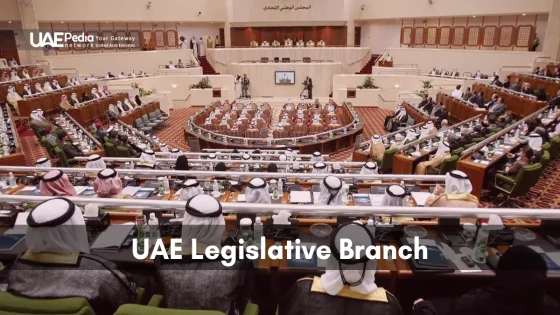The UAE Legislative Branch is key to the United Arab Emirates’ politics. It mixes old monarchical ways with new federal rules. Did you know H. H. Sheikh Mohamed bin Zayed Al Nahyan became UAE President on May 14, 2022? This shows how complex the UAE’s laws are.
UAE Legislative Branch: Structure and Constitutional Foundation
The United Arab Emirates has a special way of making laws. Its Constitution sets out the rights of citizens and the rules of the country. The country’s laws are made by the Federal National Council (FNC).

Federal National Council Composition and Selection Process
The FNC has 40 members. Half are elected, and the other half are chosen by the rulers of each emirate. This change happened in 2006 to make the FNC more representative.
Constitutional Powers and Legislative Authority
The UAE Constitution gives the FNC the power to make laws and check on the government. It helps shape the country’s laws. In 2008, the FNC’s role was made stronger to work better with the Cabinet.
Role of the Federal Supreme Council in Legislation
The Federal Supreme Council, made up of the rulers of seven emirates, has a big say in laws. They make sure laws fit the country’s goals.
Legislative Jurisdiction Between Federation and Emirates
The UAE Constitution divides power between the federal government and the emirates. It says who gets to make laws in what areas. This helps the country run smoothly at both national and local levels.
| Legislative Body | Composition | Key Responsibilities |
|---|---|---|
| Federal National Council | 40 members (20 elected, 20 appointed) | Consultative role, legislative and supervisory functions |
| Federal Supreme Council | Rulers of the seven emirates | Ratification of federal laws and decrees |
| UAE Cabinet | 22 members, led by Prime Minister | Executive authority, policy implementation |
The UAE’s federal-emirate power distribution serves as a model for balancing national unity with local autonomy, particularly in resource-rich federations. Ref.: “Almezaini, K. (2012). The UAE and Foreign Policy: Foreign Aid, Identities and Interests. Routledge.”
Legislative Process and Policy Implementation
The UAE has a special way of making laws. It covers all levels, from federal to emirate. Federal laws are key, guiding the country with the Constitution’s rules.
When it’s urgent, the President and Cabinet can make laws. These laws are strong, but they can’t go against the Constitution. The Council of Ministers helps by making sure laws are followed.
Ministries and federal groups also play a big part. They make rules and circulars to carry out laws. This makes the legal system flexible and ready to change with the UAE’s needs.
| Legislative Tool | Issuing Authority | Purpose |
|---|---|---|
| Federal Laws | Federal National Council | Regulate strategic matters |
| Decrees by Law | President and Cabinet | Address urgent issues |
| Cabinet Resolutions | Council of Ministers | Execute federal laws |
| Ministerial Decisions | Individual Ministries | Implement laws within jurisdiction |
The UAE is working hard to make its laws better. By May 2015, the Ministry of Justice had made 95% of its services online. This includes things like eSessions and eMarriage, making things easier for everyone.
Read more: Exploring the Significance of the UAE Supreme Council
The UAE’s law-making branch has seen big changes lately. This shows the country’s dedication to better laws and more people taking part in politics. The first elections for the Federal National Council in 2006 were a big step forward.
But, there are still big challenges in UAE governance. The country said no to joining important global treaties like the International Covenant on Civil and Political Rights. This shows there’s more work to do.
Also, the UAE needs to do better for its workers. Many workers from other countries live and work in the UAE. They need better rights and protection.
The UAE’s laws and foreign policy go hand in hand. The country wants to grow its influence worldwide. But, it must also focus on improving its laws and respecting human rights.
The UAE’s law-making branch has a big job ahead. It must keep up with the country’s fast changes. It also needs to keep growing the economy and working with other countries.

















